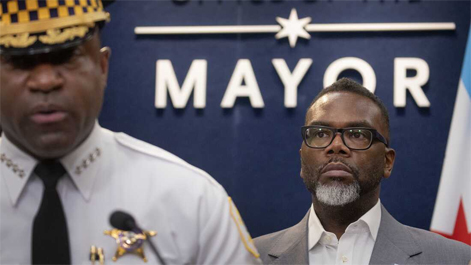|
|
|
|
|
|
 |
|
|
Chicago
Mayor
Brandon
Johnson
attends
a press
conference
in
January.
This
weekend,
Johnson
called
President
Trump's
threat
to send
the
National
Guard to
Chicago
"uncoordinated,
uncalled
for, and
unsound."
Scott
Olson/Getty
Images |
| |
Major US
Cities
Push
Back
Against
Trump's
Federal
Military
Police
Deployments
Mayors
and
governors
across
Democratic
strongholds
unite in
opposition
as
administration
expands
law
enforcement
takeovers
beyond
Washington
Li Haung
-
National-Politics
Tell Us
USA News
Network
Democratic
leaders
in major
American
cities
are
mounting
fierce
resistance
to
President
Donald
Trump's
unprecedented
use of
federal
troops
and
National
Guard
units
for
local
policing,
as the
administration
threatens
to
expand
deployments
to
Chicago,
New
York,
Baltimore,
Philadelphia,
and
Oakland.
The
administration
has
already
implemented
federal
takeovers
in
Washington
and Los
Angeles.
Cities
Mount
Legal
and
Political
Resistance
Chicago
Mayor
Brandon
Johnson
led the
charge
against
Trump's
threats,
declaring
any
deployment
"illegal
and
costly"
in a
statement
Friday.
The
mayor
called
Trump's
approach
"uncoordinated,
uncalled
for, and
unsound,"
warning
that
unlawfully
deploying
the
National
Guard
could
"inflame
tensions
between
residents
and law
enforcement."
Illinois
Governor
J.B.
Pritzker
joined
Johnson
in
condemning
what he
called
Trump's
attempt
to
"intimidate
his
political
rivals"
and
"manufacture
a
crisis."
Pentagon
Preparations
Revealed
Recent
reports
indicate
the
Pentagon
has been
planning
potential
military
operations
in
Chicago
for
weeks.
Three
Republican-led
states
have
already
pledged
National
Guard
support,
with
West
Virginia
deploying
300-400
troops,
South
Carolina
sending
200, and
Ohio
contributing
150.
Legal
Questions
Mount
Civil
liberties
organizations
and
local
leaders
are
raising
constitutional
concerns
about
Trump's
use of
military
forces
for
domestic
policing.
The
American
Civil
Liberties
Union
condemned
what it
called
Trump's
"threats
to use
the
military
in
cities
across
the
country,"
citing
grave
concerns
about
potential
civil
rights
abuses.
Legal
experts
note
that
while
Trump
has
direct
command
over the
D.C.
National
Guard,
deploying
Guard
units in
other
states
typically
requires
gubernatorial
consent—a
hurdle
the
administration
may try
to
circumvent
through
federal
emergency
declarations.
Cities
Dispute
Crime
Claims
The
targeted
mayors
dispute
Trump's
crime
claims,
pointing
to
declining
statistics
in their
jurisdictions.
Thousands
marched
through
Washington
over the
weekend
to
protest
the
federal
deployments.
Unprecedented
Federal
Intervention
Trump's
deployment
of
military
forces
for
domestic
policing
represents
a
dramatic
escalation
in
federal-local
tensions.
The
president
has made
clear
his
intention
to
replicate
the
Washington
and Los
Angeles
operations
in
additional
Democratic-led
cities,
setting
up
potential
constitutional
confrontations
over the
limits
of
federal
power in
local
governance.
As the
standoff
intensifies,
Democratic
leaders
across
the
targeted
cities
are
coordinating
their
resistance,
viewing
the
federal
deployments
not just
as
policy
disagreements
but as
fundamental
threats
to
democratic
governance
and
local
autonomy.
The
confrontation
over
federal
military
deployments
appears
poised
to
become a
defining
battle
of
Trump's
second
term,
testing
the
constitutional
balance
between
federal
authority
and
local
self-governance
in ways
not seen
since
the
civil
rights
era.
|
|
|
|
|
|
|
|
|